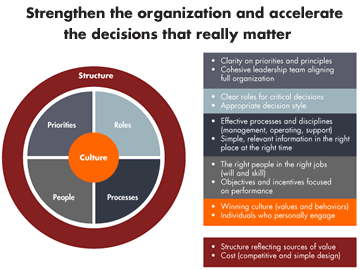Harvard Business Review
Who's got time to worry about building a stronger organization in an acute downturn? Surely executives can't focus on internal issues when so many other pressing matters are crowding in on them.
One CEO we work with explained this struggle in stark terms: "Our revenues are down fifty percent and earnings are negative," he said. "We're in survival mode. All we can do is cut our costs, watch our cash, and try to hold on. We don't have time or resources to focus on organizational concerns."
But another senior executive had a different answer. "Our business is challenging, but we're not in a crisis," she said. "Frankly, this is a unique opportunity for us to make improvements in the organization—our people, our processes, the way we make decisions, how we execute. If we do it now we'll come out of this recession way ahead of our competitors."
It's clear enough how a company that is relatively strong can gain by strengthening its organization. Turbulence offers a rare chance to bring in new talent and improve the way that organizations function. But while skepticism from executives under stress is natural, companies in dire straits have even more to gain from investing in their organizations. They often lack the organizational capabilities to take on the challenges they face. Some rush to snap judgments and ill-considered decisions. Others stall, unable to make key decisions. Some of these companies badly need new people and the perspectives they bring to help the business survive. They may need to overhaul dysfunctional cultures—the kind, for instance, that supported excessive risk and reward without accountability. They certainly need to revisit the questionable decision processes that landed them in so much trouble.
View the larger version of this chart
The fact is, strengthening the organization is one of the most powerful levers any company can pull to improve its performance in a downturn. As we've said throughout this series, industries are affected differently by different recessions. Individual companies occupy stronger or weaker competitive positions. Some have adequate financial resources; others are strapped for cash. These differences determine a company's action plan in turbulence.
But even though the situations and necessary actions vary widely, the questions that companies must ask to strengthen their organizations are largely the same. What are the critical decisions we must address in this downturn? Do we need to adjust our organizational structure to address them effectively? How should our roles and processes change? Will our most experienced people be able to make and execute the key decisions, or are new skills and perspectives required? Which aspects of our culture reinforce decision effectiveness, and which should be thrown out?
Adopting this "decision lens"—by identifying the critical decisions and then determining what needs to change in order to help the organization make and execute those decisions effectively-is the single most important step a company can take to improve the performance of its organization. It helps leaders focus their efforts where they will have the most impact during a downturn. And it positions the company to accelerate when the economy turns around.
To read more about how global companies are using a decision lens to strengthen their organizations, click here.
Marcia Blenko is a partner with Bain & Company and leader of Bain's Global Organization practice. Darrell Rigby leads Bain's global practices in Retail and Innovation.

Decide & Deliver
Learn more about the five steps that leading organizations use to make great decisions quickly and execute them effectively.
